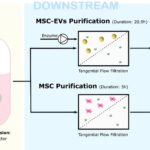Due to the emergence of antibiotic-resistant bacteria, minor wounds and infections are likely to become potentially fatal. Within this context, phage therapy is emerging as an interesting alternative. Phage therapy resorts to bacteriophages (i.e., viruses that infect bacteria) to combat bacterial infections, taking advantage of phages’ specificity and low toxicity. However, some obstacles still prevent the wider adoption of phage therapy, namely adequate purification operations.
In a recent study published in Journal of Chromatography A, BERG-iBB researchers João Saavedra (now currently at UCIBIO), Ana Rita Silva-Santos, Sofia Duarte and Ana Margarida Azevedo developed scalable downstream processing protocols, mostly based on the use of anion-exchange chromatography (AEC), using model lytic phage T4 and Escherichia coli as the host.
This strategy aimed at removing process-related impurities like host cell DNA, proteins and endotoxins, whose presence is highly restricted by regulatory agencies, particularly for intravenous (IV) applications. Since endotoxins and phages are negatively charged, the use of an alkaline phosphatase (AP) prior to AEC was investigated to reduce their net negative charge and allow an efficient separation during chromatography. Different ligands and supports were studied, achieving up to 45.1% of global phage recovery and 98.8% of endotoxin removal. In addition, in a proof-of-concept, some processes were confirmed to be eligible for IV administration, as far as the maximum allowed amount of endotoxins is concerned.
Link to paper: https://www.sciencedirect.com/science/article/pii/S0021967325002389
This study was developed under the scope of the FCT funded projects UIDB/04565/2020 and UIDP/04565/2020 of the Research Unit IBB; and of the project LA/P/0140/2020 of the Associate Laboratory Institute for Health and Bioeconomy – i4HB
-
 Previous PostCulturable Yeast Diversity Associated with Industrial Cultures of the Microalga Microchloropsis gaditana and Their Ability to Produce Lipids and Biosurfactants
Previous PostCulturable Yeast Diversity Associated with Industrial Cultures of the Microalga Microchloropsis gaditana and Their Ability to Produce Lipids and Biosurfactants- Next PostOperational and economic evaluation of future mesenchymal stromal cells-derived extracellular vesicles (MSC-EVs) therapies




